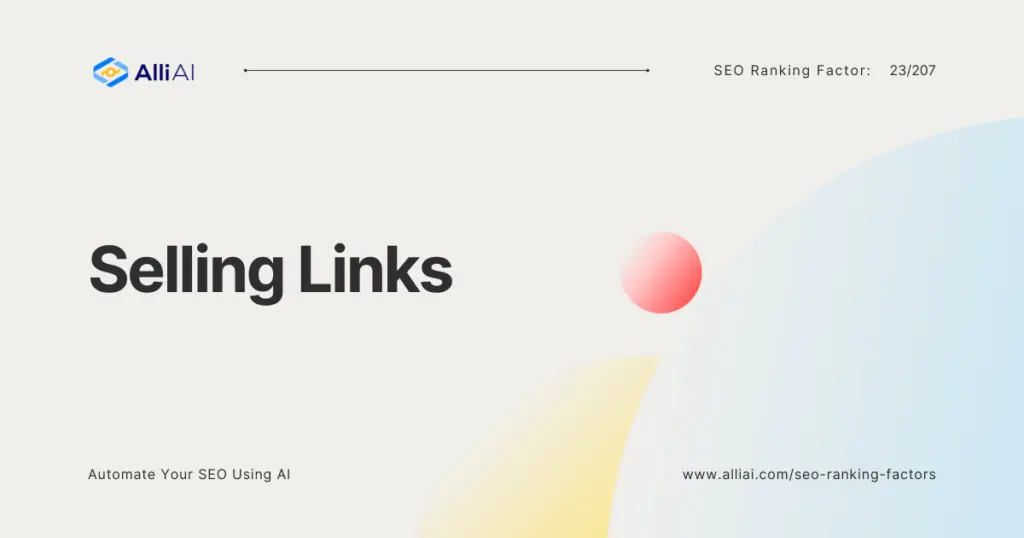Understanding Selling Links as a Ranking Factor
Selling links, in the context of SEO, refers to the practice of websites exchanging monetary compensation for the placement of backlinks. To liken this to a real-life analogy, consider the practice of paid advertising in traditional media, where a business pays for advertisements in a magazine, only in the digital landscape, the currency buys visibility and authority through links rather than ad space.
Why is Selling Links Important in SEO?
Selling links has historically been a contentious topic in the SEO community due to its potential to manipulate search engine rankings artificially. Search engines, especially Google, have aimed to make the internet a level playing field where links are earned based on the quality and relevance of content rather than the depth of one’s pockets. Hence, while selling links might seem like a shortcut to boosting a site’s SEO performance, it comes with significant risks and considerations.
How Selling Links Affects SEO
Despite the risks, the impact of selling links on SEO cannot be understated—both positively, in the short term, and potentially detrimentally, in the long run. Sites that acquire links from authoritative domains may see a temporary boost in their SEO rankings due to the perceived endorsements from these reputable sources. However, Google’s algorithm updates like Penguin aim to penalize sites engaging in manipulative link schemes, demonstrating the precarious nature of relying on such a strategy.
Studies and analyses have shown time and again how backlinks correlate with higher rankings in search engine results pages (SERPs). For instance, a study by Backlinko found a direct correlation between the number of backlinks and the ranking of pages on Google. However, it’s crucial to note the emphasis on quality and relevance of links over their quantity, underscoring the risk involved in simply ‘buying’ backlinks without regard for these factors.
How Can Alli AI Help with Selling Links?
At Alli AI, we understand the importance of backlinks in a comprehensive SEO strategy and the temptation that selling and buying links presents to businesses eager for quick search engine wins. Consequently, we created Alli AI to navigate the complexities of link building ethically and effectively. Our tool employs sophisticated algorithms that analyze your website’s profile and industry landscape to identify natural, high-quality link-building opportunities. Instead of risking your site’s reputation with search engines by engaging in risky link-selling practices, we focus on sustainable SEO strategies that bring long-term benefits, steering clear of any behavior that could be penalized by search engines.
By leveraging Alli AI, businesses can ensure their link-building strategies comply with search engine guidelines, promoting a healthier, more resilient SEO profile. Our approach to optimizing your site’s link profile includes:
– Content Strategy Development: Enhancing your site’s content to naturally attract high-quality backlinks.
– Competitor Analysis: Identifying where your competitors are getting their links from and discovering opportunities to earn similar or better links.
– Outreach Campaigns: Automated and personalized outreach campaigns to relevant sites for genuine link-building opportunities.
FAQ
How Can I Build Backlinks Without Buying Them?
Focusing on creating high-quality, valuable content that others want to link to is the most sustainable way to earn backlinks. Engage with your community, leverage social media, and consider guest blogging on reputable sites within your niche to increase your visibility and the likelihood of naturally accruing backlinks.
Are All Paid Links Considered Bad by Google?
Google differentiates between links bought for advertising purposes with clear disclosures and those intended to manipulate PageRank. The latter is against Google’s Webmaster Guidelines. If a paid link is flagged as sponsored or nofollow, it indicates transparency, which is less likely to be penalized.
How Can I Identify Harmful Backlinks?
Use tools like Alli AI to analyze your backlink profile for any links that might be considered low quality or spammy by search engines. Look for links from non-relevant domains, spam sites, and those with a high spam score. Regular audits can help you identify and disavow harmful backlinks to maintain a healthy site profile.
Conclusion
While selling links might seem like a viable strategy to quickly enhance your site’s SEO, the potential long-term repercussions outweigh the short-term gains. Engaging in or purchasing links from dubious sources can lead to penalties from search engines, plummeting your rankings, or even getting your site banished from SERPs. Instead, focusing on earning links through quality content and ethical SEO practices is key to sustainable online success.






